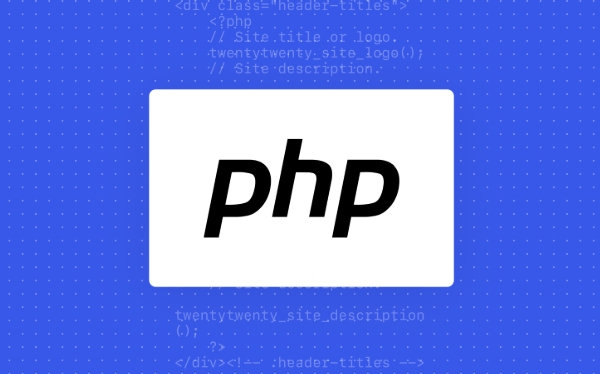Optimizing the for loop performance of PHP requires a number of measures: 1. Cache loop conditions, such as pre-storing the count() result to avoid repeated calls per iteration; 2. Prioritize foreach when no manual control of the index is required, because it is more efficient and less error-prone; 3. Move unchanged operations in the loop out of the loop, such as configuration acquisition or object creation; 4. Use references (&) to prevent value copying when processing large arrays, and improve memory efficiency; 5. Avoid string splicing in the loop, and first store fragments into the array and then merge with implode(); 6. In a very small number of performance-critical scenarios, loop expansion can be considered to reduce the number of iterations but sacrifice readability; 7. Always use tools such as Xdebug, Blackfire, or microtime() to optimize before and after performance comparison to ensure that improvements are effective. Ultimately, the code readability and correctness should be based on the premise of code readability and correctness, and optimization should be given to the improvement of algorithms and data structures. However, mastering these details will help improve the scalability and efficiency of PHP applications in high load scenarios.

When it comes to PHP performance, loops—especially for loops—are often overlooked as a source of inefficiency. While modern PHP (7.4 ) is significantly faster than its predecessors, poorly written loops can still drag down application speed, especially when processing large datasets. Optimizing for loops isn't just about shaving off microseconds; it's about writing scalable, maintainable, and efficient code.

Here's a deep dive into practical and impactful ways to optimize PHP for loops.
1. Cache the Loop Condition (Avoid Recalculating count() )
One of the most common performance pitfalls is calling count() in the loop condition:

for ($i = 0; $i < count($array); $i ) {
// do something
} Since count() is evaluated on every iteration, this becomes costly for large arrays. The fix? Cache the count:
$length = count($array);
for ($i = 0; $i < $length; $i ) {
// do something
}This simple change reduces function call overhead and improves performance noticeably in loops with thousands of iterations.

Note:
count()is actually very fast on modern PHP due to internal optimizations (it's O(1) for arrays), but the principle holds—avoid function calls in loop conditions when possible.
2. Prefer foreach Over for When Appropriate
If you're iterating over an array and don't need manual index control, foreach is usually faster and more readable:
foreach ($array as $value) {
// do something
} foreach operates directly on internal array points and avoids index arithmetic. It's also less error-prone and automatically handles associated arrays.
Use for only when you specifically need:
- Index manipulation (eg, jumping by 2)
- Reverse iteration
- Accessing multiple arrays by index
3. Minimize Work Inside the Loop
Keep the loop body as lean as possible. Move invariant logic outside:
// Bad: function call inside loop
for ($i = 0; $i < $length; $i ) {
processItem($array[$i], getUserConfig());
}
// Good: move invariant call outside
$config = getUserConfig();
for ($i = 0; $i < $length; $i ) {
processItem($array[$i], $config);
}This applies to object creation, database queries, or expensive function calls that don't change per iteration.
4. Use References to Avoid Copying Large Values
When working with large arrays and you need to modify elements, use references to prevent value copying:
foreach ($items as &$item) {
$item[&#39;processed&#39;] = true;
}
unset($item); // Important: avoid accidental reference reuse Without the & , PHP may copy large array elements, leading to memory and performance issues.
5. Avoid String Concatenation in Loops
Building strings inside a loop using .= can be slow due to repeated memory allocation:
$result = &#39;&#39;;
for ($i = 0; $i < $length; $i ) {
$result .= $array[$i]; // inefficient
} Instead, collect values in an array and implode() :
$parts = [];
for ($i = 0; $i < $length; $i ) {
$parts[] = $array[$i];
}
$result = implode(&#39;&#39;, $parts);This approach is significantly faster for large datasets.
6. Consider Loop Unrolling (Rarely Needed)
Loop unrolling reduces the number of iterations by doing multiple operations per cycle:
$length = count($array);
for ($i = 0; $i < $length; $i = 2) {
echo $array[$i];
if ($i 1 < $length) {
echo $array[$i 1];
}
}This reduces loop overhead but harms readability. Only consider this in performance-critical, tight loops—and only after profiling.
7. Profile Before and After
Never optimize blindly. Use tools like:
- Xdebug with profiler
- Blackfire.io
- Tideways
- Built-in
microtime(true)for simple benchmarks
Example benchmark:
$start = microtime(true);
for ($i = 0; $i < 100000; $i ) {
// test code
}
$end = microtime(true);
echo "Time: " . ($end - $start) . " seconds";Measure the actual impact. Often, the bottleneck isn't the loop itself but what happens inside it.
Final Thoughts
Optimizing for loops in PHP boils down to:
- Reducing function calls in conditions
- Choosing the right loop type
- Minimizing work inside the loop
- Being mindful of memory and data copying
But remember: readability and correctness come first . Optimize only when necessary, and always measure.
In most real-world applications, algorithmic improvements (eg, better data structures or caching) have a far greater impact than loop tweaks.
Still, understanding these low-level details helps you write better code—especially when scaling matters.
Basically, don't overthink every loop, but don't ignore them either.
The above is the detailed content of Optimizing PHP For Loops: A Deep Dive into Performance. For more information, please follow other related articles on the PHP Chinese website!

Hot AI Tools

Undress AI Tool
Undress images for free

Undresser.AI Undress
AI-powered app for creating realistic nude photos

AI Clothes Remover
Online AI tool for removing clothes from photos.

Clothoff.io
AI clothes remover

Video Face Swap
Swap faces in any video effortlessly with our completely free AI face swap tool!

Hot Article

Hot Tools

Notepad++7.3.1
Easy-to-use and free code editor

SublimeText3 Chinese version
Chinese version, very easy to use

Zend Studio 13.0.1
Powerful PHP integrated development environment

Dreamweaver CS6
Visual web development tools

SublimeText3 Mac version
God-level code editing software (SublimeText3)

Hot Topics
 PHP Variable Scope Explained
Jul 17, 2025 am 04:16 AM
PHP Variable Scope Explained
Jul 17, 2025 am 04:16 AM
Common problems and solutions for PHP variable scope include: 1. The global variable cannot be accessed within the function, and it needs to be passed in using the global keyword or parameter; 2. The static variable is declared with static, and it is only initialized once and the value is maintained between multiple calls; 3. Hyperglobal variables such as $_GET and $_POST can be used directly in any scope, but you need to pay attention to safe filtering; 4. Anonymous functions need to introduce parent scope variables through the use keyword, and when modifying external variables, you need to pass a reference. Mastering these rules can help avoid errors and improve code stability.
 How to handle File Uploads securely in PHP?
Jul 08, 2025 am 02:37 AM
How to handle File Uploads securely in PHP?
Jul 08, 2025 am 02:37 AM
To safely handle PHP file uploads, you need to verify the source and type, control the file name and path, set server restrictions, and process media files twice. 1. Verify the upload source to prevent CSRF through token and detect the real MIME type through finfo_file using whitelist control; 2. Rename the file to a random string and determine the extension to store it in a non-Web directory according to the detection type; 3. PHP configuration limits the upload size and temporary directory Nginx/Apache prohibits access to the upload directory; 4. The GD library resaves the pictures to clear potential malicious data.
 Commenting Out Code in PHP
Jul 18, 2025 am 04:57 AM
Commenting Out Code in PHP
Jul 18, 2025 am 04:57 AM
There are three common methods for PHP comment code: 1. Use // or # to block one line of code, and it is recommended to use //; 2. Use /.../ to wrap code blocks with multiple lines, which cannot be nested but can be crossed; 3. Combination skills comments such as using /if(){}/ to control logic blocks, or to improve efficiency with editor shortcut keys, you should pay attention to closing symbols and avoid nesting when using them.
 How Do Generators Work in PHP?
Jul 11, 2025 am 03:12 AM
How Do Generators Work in PHP?
Jul 11, 2025 am 03:12 AM
AgeneratorinPHPisamemory-efficientwaytoiterateoverlargedatasetsbyyieldingvaluesoneatatimeinsteadofreturningthemallatonce.1.Generatorsusetheyieldkeywordtoproducevaluesondemand,reducingmemoryusage.2.Theyareusefulforhandlingbigloops,readinglargefiles,or
 Tips for Writing PHP Comments
Jul 18, 2025 am 04:51 AM
Tips for Writing PHP Comments
Jul 18, 2025 am 04:51 AM
The key to writing PHP comments is to clarify the purpose and specifications. Comments should explain "why" rather than "what was done", avoiding redundancy or too simplicity. 1. Use a unified format, such as docblock (/*/) for class and method descriptions to improve readability and tool compatibility; 2. Emphasize the reasons behind the logic, such as why JS jumps need to be output manually; 3. Add an overview description before complex code, describe the process in steps, and help understand the overall idea; 4. Use TODO and FIXME rationally to mark to-do items and problems to facilitate subsequent tracking and collaboration. Good annotations can reduce communication costs and improve code maintenance efficiency.
 Quick PHP Installation Tutorial
Jul 18, 2025 am 04:52 AM
Quick PHP Installation Tutorial
Jul 18, 2025 am 04:52 AM
ToinstallPHPquickly,useXAMPPonWindowsorHomebrewonmacOS.1.OnWindows,downloadandinstallXAMPP,selectcomponents,startApache,andplacefilesinhtdocs.2.Alternatively,manuallyinstallPHPfromphp.netandsetupaserverlikeApache.3.OnmacOS,installHomebrew,thenrun'bre
 How to access a character in a string by index in PHP
Jul 12, 2025 am 03:15 AM
How to access a character in a string by index in PHP
Jul 12, 2025 am 03:15 AM
In PHP, you can use square brackets or curly braces to obtain string specific index characters, but square brackets are recommended; the index starts from 0, and the access outside the range returns a null value and cannot be assigned a value; mb_substr is required to handle multi-byte characters. For example: $str="hello";echo$str[0]; output h; and Chinese characters such as mb_substr($str,1,1) need to obtain the correct result; in actual applications, the length of the string should be checked before looping, dynamic strings need to be verified for validity, and multilingual projects recommend using multi-byte security functions uniformly.
 Learning PHP: A Beginner's Guide
Jul 18, 2025 am 04:54 AM
Learning PHP: A Beginner's Guide
Jul 18, 2025 am 04:54 AM
TolearnPHPeffectively,startbysettingupalocalserverenvironmentusingtoolslikeXAMPPandacodeeditorlikeVSCode.1)InstallXAMPPforApache,MySQL,andPHP.2)Useacodeeditorforsyntaxsupport.3)TestyoursetupwithasimplePHPfile.Next,learnPHPbasicsincludingvariables,ech






